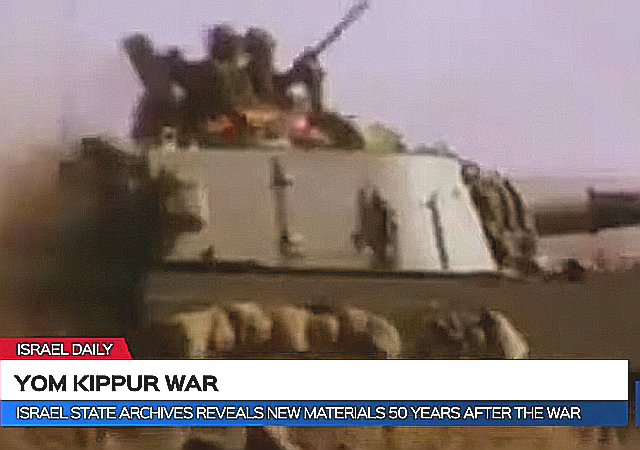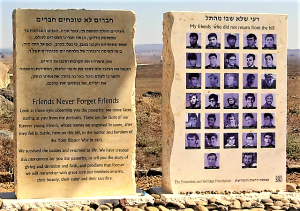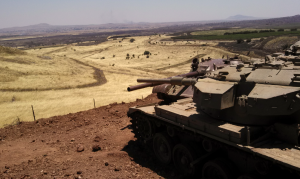Remembering the Yom Kippur War, 50 Years On
On the anniversary, IDF Chief of Staff Herzi Halev warns: “We must be more prepared than ever for a multi-aspect and extensive military conflict.”

As Jews across Israel observed the fast of Yom Kippur, the Jewish day of atonement, they also marked the fiftieth anniversary of the war of 1973. The war, which lasted 19 days, began on October 6, 1973, when a coalition of Arab states led by Egypt and Syria launched a surprise attack against Israel coinciding with the Jewish holy day.
Today marks 50 years since the outbreak of the Yom Kippur War. On the holiest day in the Jewish calendar, Egypt and Syria launched a surprise attack.
Israel was outgunned, outmanned, and caught completely by surprise. Over 18 days of fighting, Israel lost 2,688 soldiers, before… pic.twitter.com/Ojsg1q5QuH
— Aviva Klompas (@AvivaKlompas) September 25, 2023
The war was yet another failed attempt by Arab rulers, backed by massive Soviet military support, to undo the debacle of the 1967 Arab-Israeli Six-Day War. After the initial Israeli retreat in the face of a surprise multi-front assault, the Israeli military went on the offensive, regaining ground and pushing back the Arab aggressors.
At the time of the war, Golda Meir was Israel’s prime minister, and Moshe Dayan was the country’s defense minister. Future Prime Minister Ariel Sharon, then a major general, led a successful counteroffensive in the Sinai peninsula against Egypt.
In northern Israel, outnumbered and outgunned Israeli defenders faced the Syrian armour. In Tel Saki, 60 Israeli paratroopers and 45 tanks held back some 11,000 Syrian infantry soldiers and 900 tanks in a three-day battle, making it one of the war’s most decisive battles in the north. In the Valley of Tears (Emek HaBakha in Hebrew), Israeli defenders destroyed superior Soviet-made tanks. They repelled the Syrian army, crushing the dictator Hafiz al-Assad’s dream of capturing the strategic Golan Heights.
In 2013, Professor William A. Jacobson visited the former battlefields of Valley of Tears and Tel Saki, and posted his account.
https://twitter.com/HonestReporting/status/1705942512836169853Earlier this month, Israel declassified all remaining documents on the war, shedding new light on the historic event. Israeli intelligence agency Mossad released a book titled “Some Day” detailing key revelations:
The Jerusalem Post reported on September 7:
The title is taken from a statement made by then-prime minister Golda Meir to then-Mossad chief Zvi Zamir. The book presents original internal Mossad cables, summaries, photos, and other materials not revealed before in their entirety.
According to Zamir’s real-time notes from October 1971, after he revealed to Meir aspects of then-Egyptian president Anwar Sadat’s strategy as leaked by the Mossad’s top spy, “the Angel,” Meir said to him, “Some day, when it can be revealed, you and your team will get a prize.”
Agent code-named the “Angel” was identified in 2002 as Ashraf Marwan, the son-in-law of Egypt’s former President Gamal Abdel Nasser. His story was turned into a 2018 Netflix spy thriller by the same name.
50 years ago, when the #YomKippur War erupted in Israel, legendary musician and true lover and defender of Israel #LeonardCohen dropped everything and headed to the Holy Land, saying: "I will go and stop Egypt's bullet." He went and performed for IDF troops on the front lines. pic.twitter.com/f2cSC9X9d9
— StandWithUs (@StandWithUs) September 24, 2023
Five decades After the war, Israel faces new challenges and opportunities. Iran is deepening its alliance with various Shi’a and Sunni Islamic terrorist groups aimed at encircling Israel. The most powerful Arab Gulf state, Saudi Arabia, is reportedly ‘on the cusp’ of a historic agreement with Israel — carrying on the legacy of the diplomatic normalization between Israel and Arab states that began with the Abraham Accords under President Donald Trump in 2020.
As the U.S. withdraws from the Middle East under President Biden’s watch, China and Russia have strengthened their military footprint in the Middle East. Iran is central to their geostrategic objective of dominating the region.
A $400 billion deal between China and Iran in 2021 reportedly allows Chinese armed forces to access Iranian military and naval bases. Both countries have also been stepping up military cooperation. Military ties between Russia and Iran have also deepened since the start of the Ukraine, with Tehran supplying assault drones in exchange for Russian military hardware and know-how.
Israel’s Chief of Staff said on the war anniversary that the Israeli military was preparing for this changing geopolitical and technological landscape in the neighborhood. The Israeli TV channel i24News reported:
Israel’s Chief of Staff Herzi Halevi on Monday marked the 50th anniversary of the Yom Kippur War with a speech to an IDF assembly, asserting that when the Jewish state is threatened its army “knows how to mobilize all its resources, put the differences aside, and attack” – just as it did in 1973.
“We must address every statement of our enemies, in words or actions,” Halevi said in his speech.
“Not to underestimate them, and not to glorify ourselves. We must be more prepared than ever for a multi-aspect and extensive military conflict, which will include maneuvering in close contact and high friction with the enemy, which will involve losses and casualties, and where the rear is also a front.”
The Yom Kippur War ended with a resounding Israeli victory that came at the cost of 2656 dead soldiers and 7251 injured. Six years later, Israel returned Sinai to Egypt in exchange for a peace treaty, the most significant agreement of its kind between until the Abraham Accords. For decades to come, many Arab states will continue to reject diplomacy and support Palestinian terrorism.
Donations tax deductible
to the full extent allowed by law.










Comments
Proving once again that God is not always on the side with the biggest Battalions.
It’s probably not a good idea to rub it in. The resentment of a lower IQ bunch for a higher IQ bunch is a flash point already.
About 2 standard deviations, and then there is their psychotic culture, perhaps worse that America’s inner cities.
Watch the movie “Golda;” it’s excellent.
And, let the vile European, Leftist dhimmis and their American Dhimmi-crat counterparts explain to the rational-minded why it is that fifty years after the Yom Kippur war, Arab Muslim terrorist thug-fanatics still hold genocidal aspirations against Israeli Jews and still resort to the same belligerence they’ve engaged in since modern Israel’s founding.
My wife & I were going to see that in the theaters. But, the reviews weren’t very good. It wasn’t until later that it occurred to me that it might have been a coordinated review-bombing campaign. We’ll have to wait until it comes to streaming now because it’s out of the theaters, at least in our city.
“the reviews weren’t very good”
I’ve learned to distrust the people who write and publish reviews. Best to assume they are lying until you seen proof to the contrary.
Make that “genocidal aspirations against all Jews”.
Hatred and contempt for Jews is in the Koran. Being outclassed and defeated by those “inferior” Jews drives some Muslims absolutely insane.
I have a strong memory of American and Canadian Jews flying to Israel to help with a war … but I don’t remember if it was the war of 1967 or 1973. Anyone know???
My guess is both, but 73 was a more dire situation that resulted in numerous people going there to help. There was an IDF tank officer who was on leave, honeymooning in Nepal, who dropped everything to get home and fight on the Golan.
Absent the Yom Kippur War, US participation in the first Gulf War would have looked much different. The Yom Kippur War HEAVILY influenced America’s military doctrine. Combined arms capability – which was in its nascency prior to that war – exploded shortly thereafter. America invested heavily in bases like Twentynine Palms and Ft Hood to expand our capabilities to train infantry alongside artillery, armor and air support units in a live-fire environment. That’s exactly what enabled our effectiveness during Gulf War I.